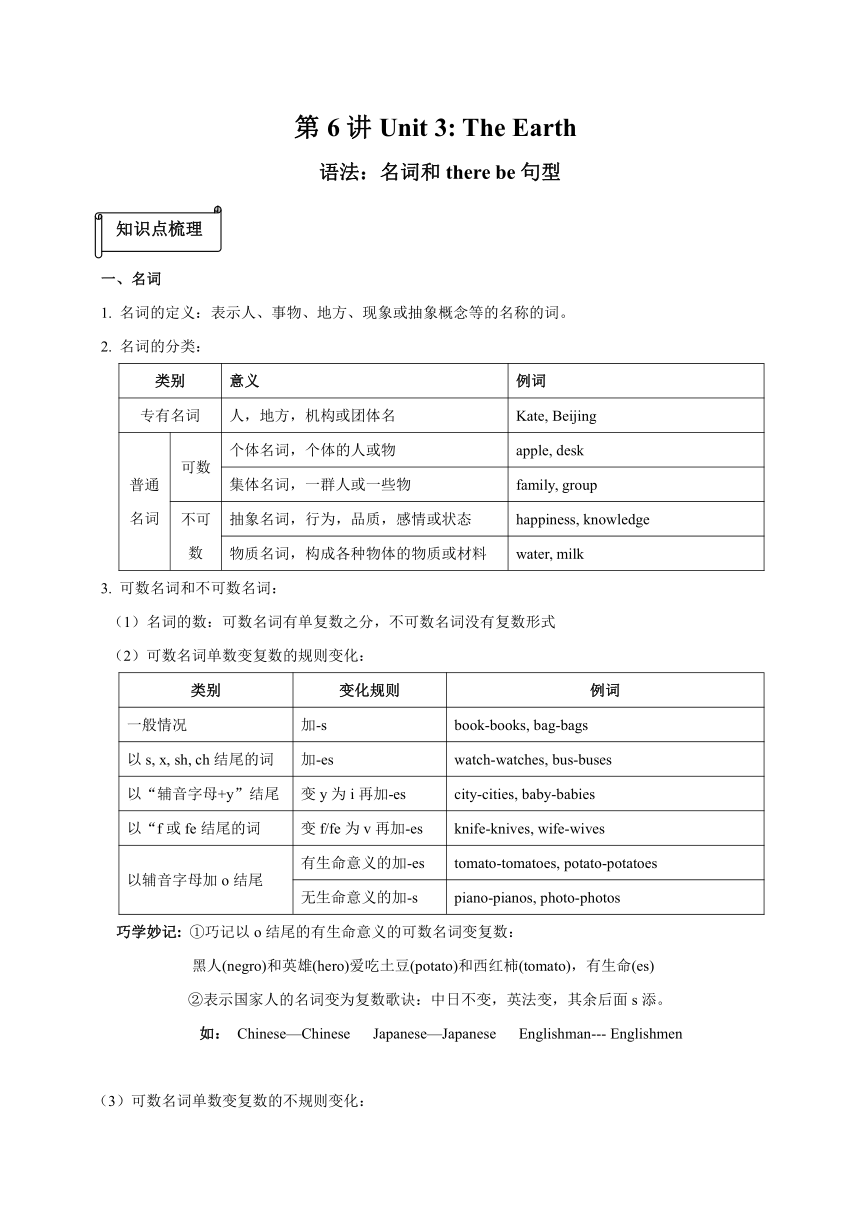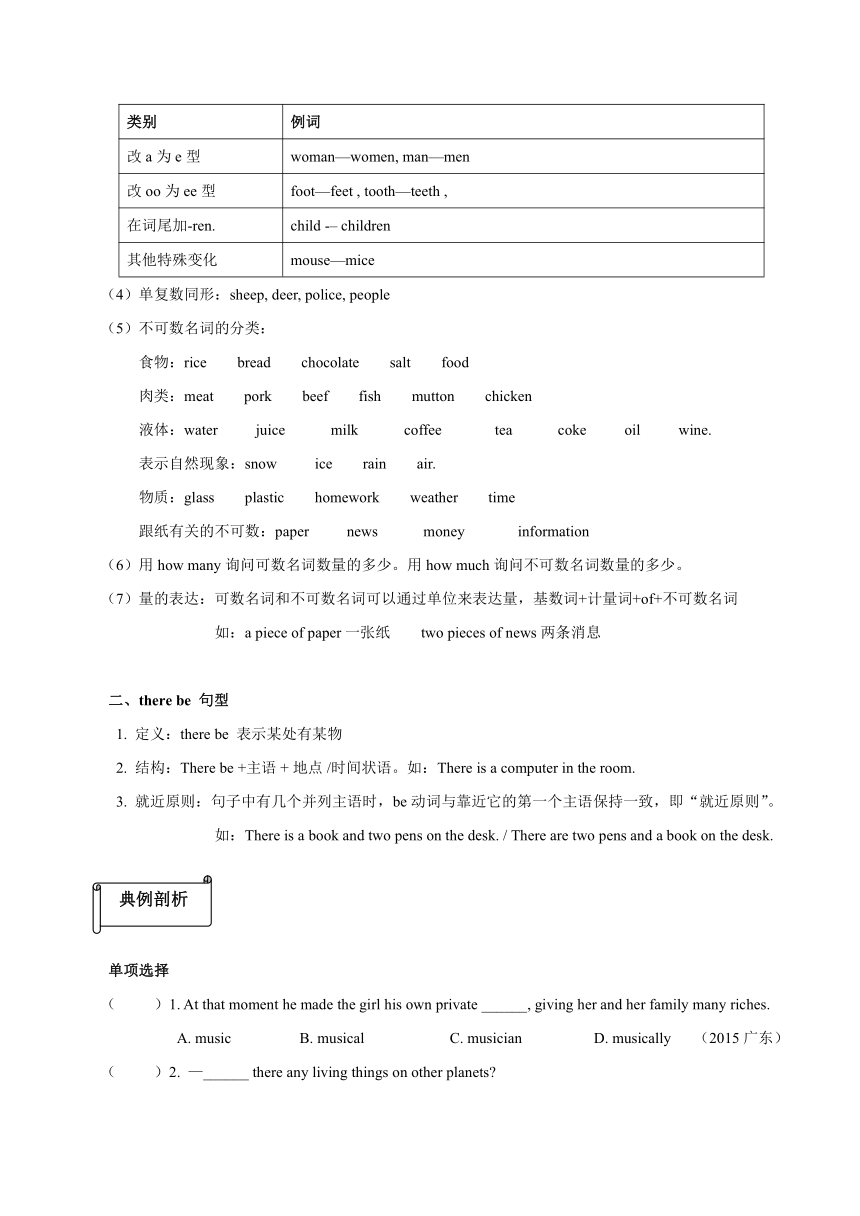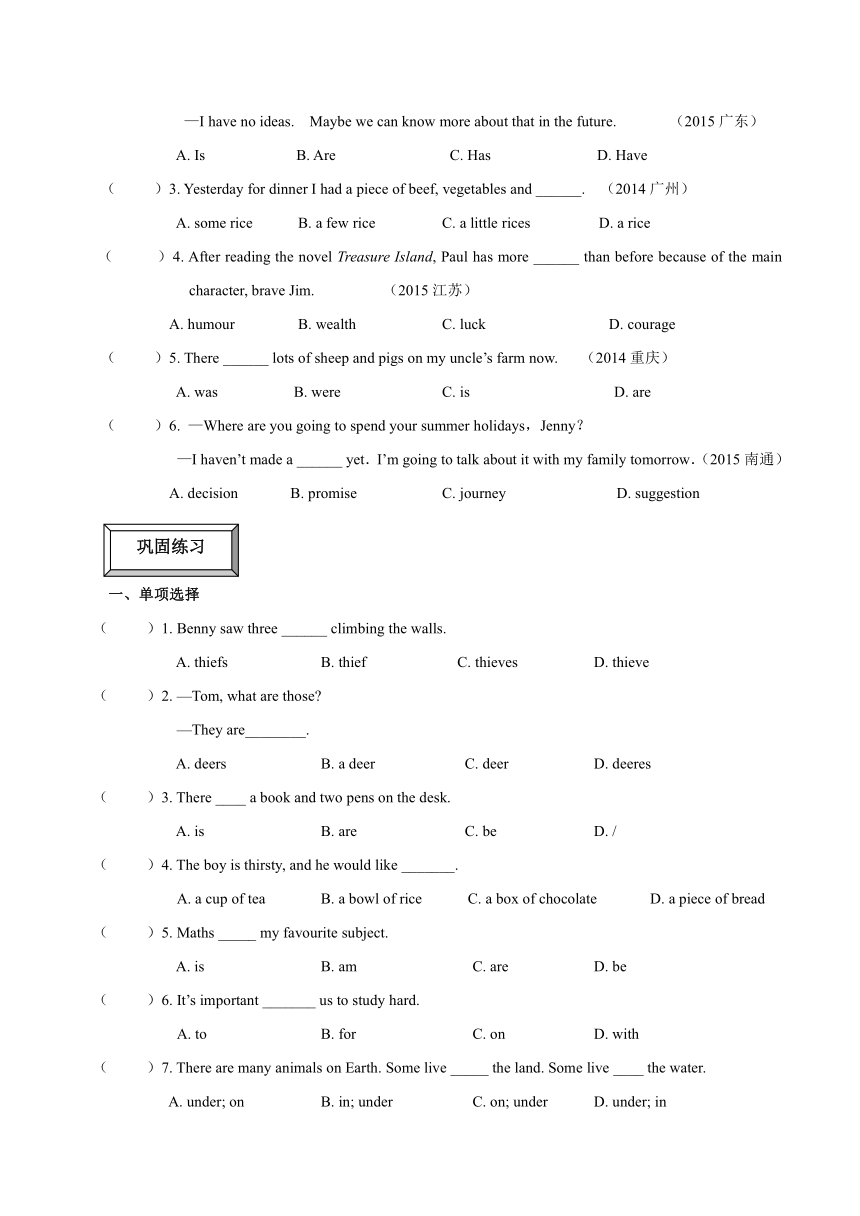牛津深圳版七上:Unit7 同步语法讲解 导学案(含答案)
文档属性
| 名称 | 牛津深圳版七上:Unit7 同步语法讲解 导学案(含答案) |  | |
| 格式 | docx | ||
| 文件大小 | 27.0KB | ||
| 资源类型 | 教案 | ||
| 版本资源 | 牛津深圳版 | ||
| 科目 | 英语 | ||
| 更新时间 | 2021-04-19 15:21:46 | ||
图片预览



文档简介
1200150011874500第6讲Unit 3: The Earth
语法:名词和there be句型
知识点梳理
一、名词
1. 名词的定义:表示人、事物、地方、现象或抽象概念等的名称的词。
2. 名词的分类:
类别
意义
例词
专有名词
人,地方,机构或团体名
Kate, Beijing
普通
名词
可数
个体名词,个体的人或物
apple, desk
集体名词,一群人或一些物
family, group
不可
数
抽象名词,行为,品质,感情或状态
happiness, knowledge
物质名词,构成各种物体的物质或材料
water, milk
3. 可数名词和不可数名词:
(1)名词的数:可数名词有单复数之分,不可数名词没有复数形式
(2)可数名词单数变复数的规则变化:
类别
变化规则
例词
一般情况
加-s
book-books,?bag-bags
以s,?x,?sh, ch结尾的词
加-es
watch-watches,?bus-buses
以“辅音字母+y”结尾
变y为i再加-es
city-cities,?baby-babies?
以“f或fe结尾的词?
变f/fe为v再加-es
knife-knives, wife-wives
以辅音字母加o结尾
有生命意义的加-es?
tomato-tomatoes, potato-potatoes
无生命意义的加-s?
piano-pianos, photo-photos?
巧学妙记: ①巧记以o结尾的有生命意义的可数名词变复数:?
黑人(negro)和英雄(hero)爱吃土豆(potato)和西红柿(tomato),有生命(es)
?②表示国家人的名词变为复数歌诀:中日不变,英法变,其余后面s添。
如: Chinese—Chinese? ?Japanese—Japanese Englishman---?Englishmen
(3)可数名词单数变复数的不规则变化:
类别
例词
改a?为e型
woman—women,?man—men
改oo?为ee?型
foot—feet?,?tooth—teeth?,
在词尾加-ren.
child?-–?children
其他特殊变化
mouse—mice
(4)单复数同形:sheep, deer, police, people?
(5)不可数名词的分类:
食物:rice bread chocolate salt food
肉类:meat pork beef fish mutton chicken
液体:water juice milk coffee tea coke oil wine.
表示自然现象:snow ice rain air.
物质:glass plastic homework weather time
跟纸有关的不可数:paper news money information
(6)用how?many询问可数名词数量的多少。用how?much询问不可数名词数量的多少。
(7)量的表达:可数名词和不可数名词可以通过单位来表达量,基数词+计量词+of+不可数名词
如:a?piece?of?paper?一张纸 two?pieces?of?news?两条消息
二、there be 句型
1. 定义:there be 表示某处有某物
2. 结构:There?be?+主语?+?地点?/时间状语。如:There?is?a?computer?in?the?room.
3. 就近原则:句子中有几个并列主语时,be动词与靠近它的第一个主语保持一致,即“就近原则”。
如:There is a book and two pens on the desk. / There are two pens and a book on the desk.
典例剖析
单项选择
( )1. At that moment he made the girl his own private ______, giving her and her family many riches.
A. music B. musical C. musician D. musically (2015广东)
( )2. —______ there any living things on other planets?
—I have no ideas. Maybe we can know more about that in the future. (2015广东)
A. Is B. Are C. Has D. Have
( )3. Yesterday for dinner I had a piece of beef, vegetables and ______. (2014广州)
A. some rice B. a few rice C. a little rices D. a rice
( )4. After reading the novel Treasure Island, Paul has more ______ than before because of the main character, brave Jim. (2015江苏)
A. humour B. wealth C. luck D. courage
( )5. There ______ lots of sheep and pigs on my uncle’s farm now. (2014重庆)
A. was B. were C. is D. are
( )6. —Where are you going to spend your summer holidays,Jenny?
—I haven’t made a ______ yet.I’m going to talk about it with my family tomorrow.(2015南通)
A. decision B. promise C. journey D. suggestion
巩固练习
一、单项选择
( )1. Benny saw three ______ climbing the walls.
A. thiefs B. thief C. thieves D. thieve
( )2. —Tom, what are those?
—They are________.
A. deers B. a deer C. deer D. deeres
( )3. There ____ a book and two pens on the desk.
A. is B. are C. be D. /
( )4. The boy is thirsty, and he would like _______.
A. a cup of tea B. a bowl of rice C. a box of chocolate D. a piece of bread
( )5. Maths _____ my favourite subject.
A. is B. am C. are D. be
( )6. It’s important _______ us to study hard.
A. to B. for C. on D. with
( )7. There are many animals on Earth. Some live _____ the land. Some live ____ the water.
A. under; on B. in; under C. on; under D. under; in
( )8. We must stop _____ the animals!
A. kill B. to kill C. killed D. killing
( )9. Don’t ____ rubbish into the river!
A. go B. throw C. pull D. push
( )10. Forests are very important. They provide us _____ a lot of things.
A. of B. to C. with D. for
二、填入所给名词的正确形式
1. I have two____________ (knife)
2. There are many ___________ here. (box)
3. There are many ___________ on the road. (bus)
4. A few ___________ are drawing on the wall. (boy)
5. The ______________ are playing football now. (child)
6. Please take two _______________ for me. (photo)
7. I like the red ________________.(tomato)
8. Would you please clean your _____________ now? (tooth)
9. Do you want some ___________? (milk)
10. There are ten ___________________in our school. (woman teacher)
三、用be动词的正确形式进行填空
1.?There?___________?a?clock?on?the?table.?
2.?___________?there?a?radio?on?your?desk??
3.?There?___________?some?students?in?the?classroom.
4.?There?___________?a?pencil,?a?book?and?two?pens?on?the table.??
5.?There?___________?two?apples,?one?orange?and?one?banana?on?the?table.??
综合练习
一、完型填空:
We sometimes call the lion "the king of the jungle(丛林)" because it is stronger and more dangerous than other animals. It can _1___ faster than many animals and it can hunt(捕猎)the best. It is the _2___ animal in the land food chain(食物链).
What is at the top of the world's food chain? _3___ are! We are not the biggest or fastest, but we are the_4___ . We could not _5___ better than lions, so we invented guns(枪). Now we can hunt the best.
People's inventions are clever, but they can be_6___, too. For example, people built _7___, and now they make the air and rivers dirty. Dirty _8___ kill fish. If bears cannot eat the fish and the bears die. Remember that we are a part of the food chain, _9___ we are in danger too! If we protect animals, we are protecting _10___ ! We should and we could do something for the world!
( )1. A. walk B. run C. swim D. jump
( )2. A. the lowest B. the highest C. the tallest D. the strongest
( )3. A. People B. Lions C. Sharks D. Cheetahs
( )4. A. strongest B. cleverest C. most interesting D. most important
( )5. A. fight B. escape C. kill D. catch
( )6. A. dangerous B. interesting C. useful D. helpful
( )7. A. hotels B. schools C. factories D. hospitals
( )8. A. rivers B. air C. land D. houses
( )9. A. if B. but C. or D. so
( )10. A. oneselves B. yourselves C. themselves D. ourselves
二、阅读理解
In England, people don’t usually talk much. You can go on a bus, or in a train, and everyone sits looking out of the window. Often they read. They read books and newspapers. But they don’t talk much.
When you meet English people, they often talk about one thing, the weather. So when you meet somebody in England, you can say, “Nice weather for the time of the year!”
“But it was a little cold yesterday,” somebody may answer.
“But it got a bit warmer later!” you can say.
Talk like this, and the English will think, “How friendly you are!”
( )1. English people often _____ on a bus.
A. talk much B. talk about C. eat something D. read papers
( )2. When you meet English people, talk like this: _______
A. How do you do? B. How are you? C. Nice weather! D. Nice to meet you!
( )3. If you talk with the English people about the weather, they will think _______.
A. you are friendly B. you are rich C. you are English D. you talk too much
( )4. English people always hope the weather will get ________.
A. better B. cooler C. colder D. hotter
( )5. Which is right?
A. English people like to talk on bus. B. English people don’t enjoy the best weather.
C. English people are the most friendly. D. English people don’t talk much.
答案:
典例剖析
单项选择:1-6:CBADDA
巩固练习:
一、单项选择:1-5:CCAAA 6-10:BCDBC
二、填入所给名词的正确形式
1. knives 2. boxes 3. buses 4. boys 5. children 6. photos 7. tomato
8. teeth 9. milk 10. women teachers
三、用be动词的正确形式进行填空
is Is are is are
综合练习
一、完型填空:1-5BDABA 6-10 ACADD
二、阅读理解:1-5 DCAAD
语法:名词和there be句型
知识点梳理
一、名词
1. 名词的定义:表示人、事物、地方、现象或抽象概念等的名称的词。
2. 名词的分类:
类别
意义
例词
专有名词
人,地方,机构或团体名
Kate, Beijing
普通
名词
可数
个体名词,个体的人或物
apple, desk
集体名词,一群人或一些物
family, group
不可
数
抽象名词,行为,品质,感情或状态
happiness, knowledge
物质名词,构成各种物体的物质或材料
water, milk
3. 可数名词和不可数名词:
(1)名词的数:可数名词有单复数之分,不可数名词没有复数形式
(2)可数名词单数变复数的规则变化:
类别
变化规则
例词
一般情况
加-s
book-books,?bag-bags
以s,?x,?sh, ch结尾的词
加-es
watch-watches,?bus-buses
以“辅音字母+y”结尾
变y为i再加-es
city-cities,?baby-babies?
以“f或fe结尾的词?
变f/fe为v再加-es
knife-knives, wife-wives
以辅音字母加o结尾
有生命意义的加-es?
tomato-tomatoes, potato-potatoes
无生命意义的加-s?
piano-pianos, photo-photos?
巧学妙记: ①巧记以o结尾的有生命意义的可数名词变复数:?
黑人(negro)和英雄(hero)爱吃土豆(potato)和西红柿(tomato),有生命(es)
?②表示国家人的名词变为复数歌诀:中日不变,英法变,其余后面s添。
如: Chinese—Chinese? ?Japanese—Japanese Englishman---?Englishmen
(3)可数名词单数变复数的不规则变化:
类别
例词
改a?为e型
woman—women,?man—men
改oo?为ee?型
foot—feet?,?tooth—teeth?,
在词尾加-ren.
child?-–?children
其他特殊变化
mouse—mice
(4)单复数同形:sheep, deer, police, people?
(5)不可数名词的分类:
食物:rice bread chocolate salt food
肉类:meat pork beef fish mutton chicken
液体:water juice milk coffee tea coke oil wine.
表示自然现象:snow ice rain air.
物质:glass plastic homework weather time
跟纸有关的不可数:paper news money information
(6)用how?many询问可数名词数量的多少。用how?much询问不可数名词数量的多少。
(7)量的表达:可数名词和不可数名词可以通过单位来表达量,基数词+计量词+of+不可数名词
如:a?piece?of?paper?一张纸 two?pieces?of?news?两条消息
二、there be 句型
1. 定义:there be 表示某处有某物
2. 结构:There?be?+主语?+?地点?/时间状语。如:There?is?a?computer?in?the?room.
3. 就近原则:句子中有几个并列主语时,be动词与靠近它的第一个主语保持一致,即“就近原则”。
如:There is a book and two pens on the desk. / There are two pens and a book on the desk.
典例剖析
单项选择
( )1. At that moment he made the girl his own private ______, giving her and her family many riches.
A. music B. musical C. musician D. musically (2015广东)
( )2. —______ there any living things on other planets?
—I have no ideas. Maybe we can know more about that in the future. (2015广东)
A. Is B. Are C. Has D. Have
( )3. Yesterday for dinner I had a piece of beef, vegetables and ______. (2014广州)
A. some rice B. a few rice C. a little rices D. a rice
( )4. After reading the novel Treasure Island, Paul has more ______ than before because of the main character, brave Jim. (2015江苏)
A. humour B. wealth C. luck D. courage
( )5. There ______ lots of sheep and pigs on my uncle’s farm now. (2014重庆)
A. was B. were C. is D. are
( )6. —Where are you going to spend your summer holidays,Jenny?
—I haven’t made a ______ yet.I’m going to talk about it with my family tomorrow.(2015南通)
A. decision B. promise C. journey D. suggestion
巩固练习
一、单项选择
( )1. Benny saw three ______ climbing the walls.
A. thiefs B. thief C. thieves D. thieve
( )2. —Tom, what are those?
—They are________.
A. deers B. a deer C. deer D. deeres
( )3. There ____ a book and two pens on the desk.
A. is B. are C. be D. /
( )4. The boy is thirsty, and he would like _______.
A. a cup of tea B. a bowl of rice C. a box of chocolate D. a piece of bread
( )5. Maths _____ my favourite subject.
A. is B. am C. are D. be
( )6. It’s important _______ us to study hard.
A. to B. for C. on D. with
( )7. There are many animals on Earth. Some live _____ the land. Some live ____ the water.
A. under; on B. in; under C. on; under D. under; in
( )8. We must stop _____ the animals!
A. kill B. to kill C. killed D. killing
( )9. Don’t ____ rubbish into the river!
A. go B. throw C. pull D. push
( )10. Forests are very important. They provide us _____ a lot of things.
A. of B. to C. with D. for
二、填入所给名词的正确形式
1. I have two____________ (knife)
2. There are many ___________ here. (box)
3. There are many ___________ on the road. (bus)
4. A few ___________ are drawing on the wall. (boy)
5. The ______________ are playing football now. (child)
6. Please take two _______________ for me. (photo)
7. I like the red ________________.(tomato)
8. Would you please clean your _____________ now? (tooth)
9. Do you want some ___________? (milk)
10. There are ten ___________________in our school. (woman teacher)
三、用be动词的正确形式进行填空
1.?There?___________?a?clock?on?the?table.?
2.?___________?there?a?radio?on?your?desk??
3.?There?___________?some?students?in?the?classroom.
4.?There?___________?a?pencil,?a?book?and?two?pens?on?the table.??
5.?There?___________?two?apples,?one?orange?and?one?banana?on?the?table.??
综合练习
一、完型填空:
We sometimes call the lion "the king of the jungle(丛林)" because it is stronger and more dangerous than other animals. It can _1___ faster than many animals and it can hunt(捕猎)the best. It is the _2___ animal in the land food chain(食物链).
What is at the top of the world's food chain? _3___ are! We are not the biggest or fastest, but we are the_4___ . We could not _5___ better than lions, so we invented guns(枪). Now we can hunt the best.
People's inventions are clever, but they can be_6___, too. For example, people built _7___, and now they make the air and rivers dirty. Dirty _8___ kill fish. If bears cannot eat the fish and the bears die. Remember that we are a part of the food chain, _9___ we are in danger too! If we protect animals, we are protecting _10___ ! We should and we could do something for the world!
( )1. A. walk B. run C. swim D. jump
( )2. A. the lowest B. the highest C. the tallest D. the strongest
( )3. A. People B. Lions C. Sharks D. Cheetahs
( )4. A. strongest B. cleverest C. most interesting D. most important
( )5. A. fight B. escape C. kill D. catch
( )6. A. dangerous B. interesting C. useful D. helpful
( )7. A. hotels B. schools C. factories D. hospitals
( )8. A. rivers B. air C. land D. houses
( )9. A. if B. but C. or D. so
( )10. A. oneselves B. yourselves C. themselves D. ourselves
二、阅读理解
In England, people don’t usually talk much. You can go on a bus, or in a train, and everyone sits looking out of the window. Often they read. They read books and newspapers. But they don’t talk much.
When you meet English people, they often talk about one thing, the weather. So when you meet somebody in England, you can say, “Nice weather for the time of the year!”
“But it was a little cold yesterday,” somebody may answer.
“But it got a bit warmer later!” you can say.
Talk like this, and the English will think, “How friendly you are!”
( )1. English people often _____ on a bus.
A. talk much B. talk about C. eat something D. read papers
( )2. When you meet English people, talk like this: _______
A. How do you do? B. How are you? C. Nice weather! D. Nice to meet you!
( )3. If you talk with the English people about the weather, they will think _______.
A. you are friendly B. you are rich C. you are English D. you talk too much
( )4. English people always hope the weather will get ________.
A. better B. cooler C. colder D. hotter
( )5. Which is right?
A. English people like to talk on bus. B. English people don’t enjoy the best weather.
C. English people are the most friendly. D. English people don’t talk much.
答案:
典例剖析
单项选择:1-6:CBADDA
巩固练习:
一、单项选择:1-5:CCAAA 6-10:BCDBC
二、填入所给名词的正确形式
1. knives 2. boxes 3. buses 4. boys 5. children 6. photos 7. tomato
8. teeth 9. milk 10. women teachers
三、用be动词的正确形式进行填空
is Is are is are
综合练习
一、完型填空:1-5BDABA 6-10 ACADD
二、阅读理解:1-5 DCAAD
